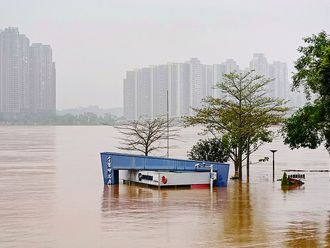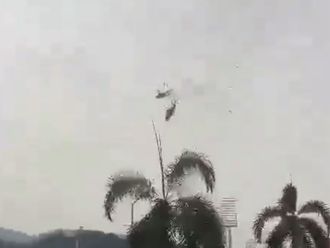Dhaka: Bangladesh’s opposition accused pro-government supporters Tuesday of trying to kill their leader Khaleda Zia after her car was shot at and stoned by a mob while campaigning in Dhaka’s mayoral elections.
Although Zia emerged unscathed from Monday evening’s attack, which took place as she stopped to tour a shopping district, supporters voiced alarm at the lack of protection from the official security forces.
Prime Minister Shaikh Hasina meanwhile accused her arch rival of making an unnecessary “drama” out of the incident which has added to the tensions in the volatile capital ahead of polling on April 28.
Zia, a two-time former premier who leads the Bangladesh Nationalist Party, is hoping that a strong showing in next week’s polls will add momentum to her long-running campaign to force new national elections.
After recently ending a lengthy stint holed up in her headquarters, Zia has been campaigning hard in the elections — the first her party has participated in since it boycotted parliamentary polls in January 2014.
Television footage showed how scores of people attacked Zia’s convoy in the Karwan Bazaar district, smashing the windows of a number of vehicles with a combination of rocks, metals rods and staves.
Fazle Elahi Akbar, a retired general who heads the BNP chief’s private security team, said shots were fired at Zia’s bullet-proofed car while she was inside but stopped short of calling it an assassination attempt.
Several of her own security personnel were injured in the violence, although none seriously.
“Her car was hit by a bullet fired from a pistol from a reasonably close range,” Akbar said, saying there were bullet marks on the vehicle.
“If it penetrated it would obviously hit her. She survived because she was in a bulletproof car.”
The BNP said that police in the area had stood idle during the violence.
“We are extremely concerned and we hope the government would take appropriate measures to ensure her security,” said Akbar who was with Zia at the time of the attack.
Police confirmed they were investigating reports of a shooting and acknowledged Zia had not been accorded close protection.
“Khaleda Zia did not get any police protection during campaigning because she or her party never sought protection from us,” Jahangir Alam Sarker, a deputy commissioner of police, told the Dhaka Tribune newspaper.
The BNP has previously accused the security forces of being behind attacks on its members, including an apparent assassination attempt against Zia’s adviser Riaz Rahman who was shot at in his car.
Moudud Ahmad, another of Zia’s top lieutenants in the BNP, said Monday’s attack was “planned and aimed to kill her”.
“This is a reflection of the government’s fascist and undemocratic mentality,” Ahmad said in a statement.
Hasina’s camp however responded derisively to the accusations.
“Khaleda Zia is staging drama ... She should stop such activities for the sake of a free, fair and transparent election,” she was quoted as saying by The Daily Star.
Bangladesh has been plagued by political unrest in the last two years, fuelled in part by Hasina’s controversial walkover re-election.
Death sentences handed down to leaders of an Islamist party allied to the BNP over their role in the former East Pakistan’s 1971 independence war also fuelled the unrest.
Scores of people have been killed in firebomb attacks on vehicles since the start of the year when Zia called a transport blockade as part of her efforts to force the government to hold fresh elections.
Bangladesh has a long history of deadly political violence, much of it centred around the families of Zia and Hasina who are known as the “Battling Begums”.
Hasina’s father, Bangladesh’s first post-independence leader, was assassinated by a group of army officers in 1975.
Zia’s husband, a hero of the independence war who went on to become president, was also assassinated by disgruntled officers six years later.












